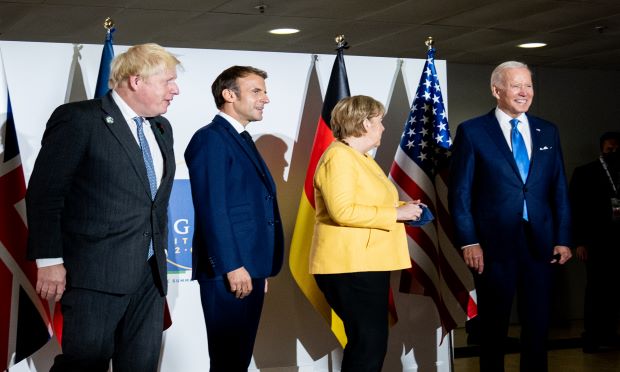Biden, major world leaders face pressure on climate and Covid

By Jim Tankersley, Katie Rogers and Shashank Bengali
ROME – Fresh off a win Saturday (30) with a global corporate tax agreement and some progress toward restoring the nuclear accord with Iran, President Joe Biden returned for the final day of the Group of 20 summit Sunday (31) facing far more difficult challenges, including pressure to take stronger action on climate change and to make concrete progress on delivering COVID vaccines to the poorest countries.
The difficult agenda facing the leaders of 20 of the wealthiest nations, their first in-person meeting since the pandemic began, illustrated a widening divide with developing countries. Those nations have argued that industrialized countries have hoarded vaccines and squandered decades of opportunities to slow the warming of the planet.
After the summit in Rome, Biden and other leaders will travel to Glasgow, Scotland, for a United Nations climate conference, where they will confront demands from scientific experts and many developing countries to rapidly reduce emissions of carbon dioxide and other greenhouse gases blamed for heating the planet. The talks in Glasgow, known as COP26, come as the UN warns of a looming climate catastrophe and are shaping up as a test of whether global cooperation is even possible to address a crisis that does not recognize national borders.
A senior administration official told reporters Saturday evening that American negotiators were pushing for concrete progress from the summit on reducing methane emissions, decarbonizing the global power sector and ending international financing for coal projects.
For Biden, who has staked his presidency on his ability to forge consensus at home and abroad, the return to in-person diplomacy presented an opportunity for good news after weeks of negative headlines.
His struggles included the battle to unify Democrats in Congress behind his huge economic and environmental spending plan, as well as trying to manage the fallout from the chaotic US withdrawal from Afghanistan. He began the weekend in Rome by smoothing things over with President Emmanuel Macron of France, acknowledging that the administration’s handling of a submarine deal had been “clumsy.”
Biden faced a trickier meeting Sunday morning with President Recep Tayyip Erdogan of Turkey, amid tensions over Ankara’s threats to expel ambassadors from the United States and other nations and its purchase of a Russian missile-defence system.
The second meeting between the men since Biden’s inauguration came just days after Erdogan had threatened to expel 10 diplomats, including the American ambassador, for calling for the release of a jailed Turkish philanthropist. That dispute was resolved with an exchange of diplomatic statements but underlined how volatile the relationship remains.
The meeting Sunday ended without any result except to keep talking, reflecting a recognition of their need to engage despite the breadth of disagreements, largely in view of Turkey’s influence in several critical regions, including Syria, Afghanistan, Libya and the Eastern Mediterranean.
Turkish media played up the length of the meeting, which lasted more than an hour and reported a government official saying that it was held in a “very positive atmosphere.”
Points of dispute between the leaders remain large, especially over Turkey’s purchase of the Russian S-400 air defence system. Erdogan has refused to step back from the purchase, despite sanctions and expulsion from a US defence program to develop the F-35 stealth fighter jet.
But facing pressure at home over a deteriorating economy from a strengthened opposition, Erdogan is looking for a deal to replace the F-35 program and has asked to purchase new, US-made F-16 fighter jets to update its fleet with money it had already spent for the F-35s.
A senior Biden administration official said that the president “took on board” Erdogan’s desire to procure F-16s “but made very clear that there is a process that we have to go through in the US and committed to continuing to work through that process.” Congressional authorization is required for the sale.
A US statement released after the meeting said that Biden “noted US concerns over Turkey’s possession of the Russian S-400 missile system. He also emphasized the importance of strong democratic institutions, respect for human rights, and the rule of law for peace and prosperity.”
A Turkish statement said the two sides agreed to boost trade, and continue to strengthen and develop strategic ties. But with no further bilateral meetings planned, the talks showed that “this is no longer a core strategic relationship for either side,” said Asli Aydintasbas, senior fellow with the European Council on Foreign Relations.
“Both want to manage it, and the Biden administration is keen to avoid new crises with Turkey,” she said.
Erdogan has not been able to deflect other disputes that have badly dented his country’s investment climate, including a Justice Department case that accuses State-owned lender Halkbank of violating US sanctions against Iran and the inclusion of Turkey on a global money laundering “grey list” for failing to do enough to curb terrorist financing.
Ahead of the meeting, officials had said that the leaders would discuss regional issues including the conflict in Syria, where Erdogan has threatened another incursion to push back Syrian government forces and allies from an area close to the Turkish border.
Afghanistan, where Turkey has been meeting with the ruling Taliban in an attempt to encourage them to adopt a more moderate stance, and Libya, where Ankara intervened militarily to support the government in Tripoli, were discussed, officials said.
-New York Times

